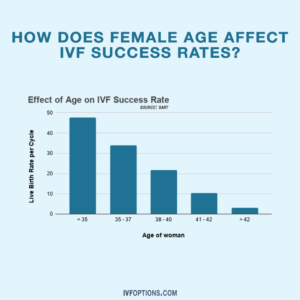How Does Age Affect IVF Success Rates?
IVF is a very complicated treatment with dozens of factors that can affect every step of the process. One of those factors that most patients focus on, is success rates. Although there are many components that impact IVF success rates, the most influential component is age.
Age and Success Rates

Age has a very strong influence on the ability for a woman to get pregnant, both naturally and through IVF. This graph shows the average IVF success rates across the United States in relation to age.
It is clear that a large amount of IVF cycles fail even for the youngest and healthiest patients. Delaying fertility treatment can only cause success rates to dramatically decrease.
In the instance, where a patient delays treatment by 7 years, they can see a drop from 48% (<35) to 2-4% (>42).
It is important to note that the chances of a successful pregnancy is continuously decreasing. Beginning at age 28, a woman’s fertility begins to decline. At age 35, the decline becomes more dramatic. In most cases, a woman’s ability to naturally conceive comes to an end around 10 years before menopause.
Eggs
Why does age have such an impact on the success rate of conceiving? It can be narrowed down to two factors; egg quality and quantity.
Women are born with all of the eggs they will have for their lifetime. Most of these never mature. Even in the youngest of years, about half of these eggs have abnormalities that will affect the ability to conceive. As women age, the abnormalities per egg increase, reducing the amount of viable eggs.
IVF
No matter what age you are, if you are planning on using your own eggs for IVF treatment, your eggs quality and quantity will ultimately affect the cost and success rate. Your Reproductive Endocrinologist is able to evaluate your ovarian reserve by assessing the levels of Estrogen, Anti-Müllerian Hormone (AMH), and Follicle-Stimulating Hormone (FSH) in your blood. High levels of estrogen or FSH or low levels of AMH may show that your ovarian reserve is low.
Injectable fertility drugs such as hCG, hMG, and rFSH help stimulate ovulation for IVF treatment. Unfortunately, these drugs can run from $5,000 – $10,000 per IVF cycle.
Donor Eggs
If you have reached an age where the success rate may be extremely low, donor eggs may be an option to consider. Unfortunately, these will also be an additional cost on top of treatment.
Tools that Can Help – IVF Options
With every factor going into IVF Treatment costing more and more, it is important to be informed about the clinic you are choosing to receive treatment from. At www.ivfoptions.com, we put the power back into the hands of the patients. By building a personalized list of clinics in your area, and including key data such as price, success rates, and quality, we help you make the right decision. Use our free tool today.

